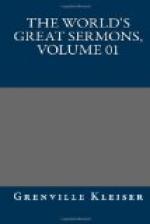By these two examples, then, we ought not only to admire virtue, but to emulate and imitate it. And let no one say these were wonderful men. True, they were wonderful and great men. But we are now required to have more wisdom than they, and than all who lived under the Old Testament. For “except your righteousness exceed that of the Scribes and Pharisees, ye shall not enter into the kingdom of heaven.” Gathering wisdom, then, from all quarters, and considering what we are told concerning a resurrection and concerning these holy men, let us frequently recite it to our souls, not only when we are actually in sorrow, but also while we are free from distress. For I have now addrest you on this subject, tho no one is in particular affliction, that when we shall fall into any such calamity, we may, from the remembrance of what has been said, obtain requisite consolation. As soldiers, even in peace, perform warlike exercises, so that when actually called to battle and the occasion makes a demand for skill, they may avail themselves of the art which they have cultivated in peace; so let us, in time of peace, furnish ourselves with weapons and remedies, that whenever there shall burst on us a war of unreasonable passions, or grief, or pain, or any such thing, we may, well armed and secure on all sides, repel the assaults of the evil one with all skill, and wall ourselves round with right contemplations, with the declarations of God, with the examples of good men, and with every possible defense. For so shall we be able to pass the present life with happiness, and to attain to the kingdom of heaven, through Jesus Christ, to whom be glory and dominion, together with the Father and the Holy Spirit, forever and ever. Amen.
AUGUSTINE
THE RECOVERY OF SIGHT BY THE BLIND
BIOGRAPHICAL NOTE
Saint Augustine (Aurelius Augustinus), one of the greatest theological fathers of the Church, was born at Tagaste, 354 A.D., and became devoted to the study of Cicero. As a Manichean he occasioned great anxiety to his mother Monica. Eventually embracing Christianity, he was baptized by Ambrose of Milan (387), on which occasion, tradition says, the Te Deum was composed by himself and his baptizer. Appointed to the See of Hippo in 395, he threw himself into the conflict against heresy and schism, his principal opponents being the Donatists and Pelagians. His sermons, powerful as they are, disappoint the modern reader by their fantastic and allegorical interpretation of Scripture, but his “Confessions,” in which he details the history of his early life and conversion, present a wonderful picture of personal experience. He is styled by Harnack “the first modern man.” He died at Hippo in 430.
THE RECOVERY OF SIGHT BY THE BLIND




